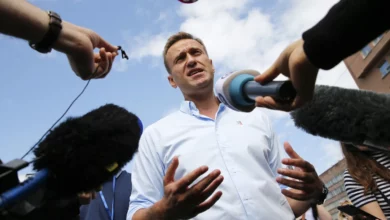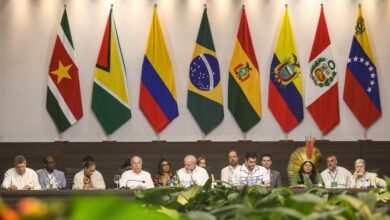Moscow–Kremlin chief Dmitry Medvedev has said the Brazilian president was unlikely to succeed in his last ditch attempt to prevent further sanctions against Iran by mediating with the Islamic Republic.
Brazil’s flamboyant president, Luiz Inacio Lula da Silva, travels to Tehran this weekend in a bid to persuade Iran to revisit a stalled fuel swap deal, though world powers are now discussing further sanctions against the Islamic Republic.
“You want me to give the odds on President Lula,” Medvedev quipped to a reporter who had asked at a joint news conference what the odds were that the Lula visit would be success.
“Okay. As my friend the Brazilian president is an optimist, I shall also be an optimist. I give 30 percent,” Medvedev said on Friday.
Asked about his odds of success at meetings with the Iranian leadership on a scale of one to 10, Lula replied: “I would give 9.9.”
Speaking in Washington, US Secretary of State Hillary Clinton said Medvedev and Lula’s exchange “illustrated the hill that the Brazilians are attempting to climb.”
Medvedev, echoing words from a senior US official this week, said Lula’s trip was probably the last chance for finding a resolution to the impasse over Iran’s nuclear program.
The United States, Israel and major EU powers say Tehran’s efforts are a front for a drive to develop atomic weapons and want to stop Iran from acquiring them.
Iran denies it is seeking a nuclear bomb while Russia has said there are valid doubts over the program’s true aims.
In a bid to win a diplomatic role fitting for Brazil’s US$1.6 trillion economy, Lula is seeking to mediate in one of the world’s most complicated international negotiations.
Brazil has a rotating seat on the UN Security Council and Lula opposes more sanctions against Iran, saying such measures usually hit the poor and could push Tehran into a corner.
He will press Iran’s leaders to revisit a stalled proposal by the International Atomic Energy Agency under which Iran would send low-enriched uranium abroad and receive a higher grade uranium in return.
“I am going to Iran with the conviction we will find an agreement,” Lula said at the news conference with Medvedev. “If we don’t find an agreement, I will go home happy because at least I was not negligent.”
The fuel deal broke down after Iran insisted on doing the swap only on its territory and the United States has accused Iran of trying to buy time by accepting Brazilian mediation.
“He has a tough mission,” Medvedev said. “I really hope that the mission of the Brazilian president ends in success. It is perhaps the last chance before taking decisions in the framework of the Security Council.”
Like China, Russian leaders have been reluctant to support new punitive measures against Tehran until all other avenues are exhausted, though Medvedev and Prime Minister Vladimir Putin, Russia’s most powerful politician, have always left open the option of further sanctions.
“If there is no change and if Iran cannot be convinced to cooperate then the international community will be forced to act in accordance with those approaches which are also being discussed by the Six,” Medvedev said.
“I would not like that development of the situation but nevertheless I cannot rule it out,” Medvedev said.
The five permanent members of the UN Security Council plus Germany are negotiating a draft sanctions resolution against Iran for refusing to halt its uranium enrichment.
Diplomats said the group’s negotiators had moved closer to agreement on a draft and might be ready to send it to the full Security Council for consideration as early as next week. One senior diplomat, however, said this was “ambitious.”
Medvedev said the positions of the six world powers were “pretty much consolidated” though he said nuances remained.
The United States is lobbying UN Security Council members to back sanctions including proposed measures targeting Iran’s mighty energy sector. Iran has about 11 percent of the world’s oil reserves and 16 percent of its natural gas.
Medvedev gave no details on what sort of sanctions Russia could support, though it has made clear it opposes an arms embargo, a ban on new investments in Iran’s energy sector and other steps Moscow says would drive Tehran into a corner.
Lula also met Putin, Russia’s paramount leader who most diplomats believe will make the ultimate call on whether to support sanctions. Putin made no comment on Iran.




